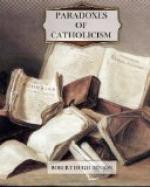(ii) “And all these things shall be added” to her. For she is Human also, in that she dwells in this world where God has placed her, and uses therefore the things with which He has surrounded her. To say that she is supernatural is not to deny her humanity any more than to assert that man has an immortal soul is to exclude the truth that he also has a body. It is this Body of hers, then—this humanity of hers which enshrines her Divinity—that claims and uses earthly things; it is this Body that dwells in houses made with hands and that claims too, in honour to herself and her Bridegroom, that, so long as her spirituality is not tarnished, these houses shall be as splendid as art can make them. For she is not a Puritan nor a Manichee; she does not say that any single thing which God has made can conceivably be of itself evil, however grievously it may have been abused; on the contrary, she has His own authority for saying that all is very good.
She uses, then, every earthly beauty that the world will yield to her, to honour her own Majesty. It may be right to set diamonds round the neck of a woman, but it is certainly right to set them round the Chalice of the Blood of God. If an earthly king wears vestments of cloth of gold, must not a heavenly King yet more wear them? If music is used by the world to destroy men’s souls, may not she use it to save their souls? If a marble palace is fit for the President of the French Republic, by what right do men withhold it from the King of kings?
But the world does withhold its wealth sometimes? Very well then, she can serve God without it, in spite of her rights. If men whine and cringe, or bully and shout, for the jewels with which their forefathers honoured God, she will fling them back again down her altar stairs and worship God in a barn or a catacomb without them. For, though she does not serve God and Mammon, she yet makes to herself friends of the Mammon of iniquity. Though she does not and never can serve God and Mammon, she will and can, when the world permits it, make Mammon serve her. For the Church is the Majesty of God dwelling on earth. She is there, in herself, utterly independent of her reception. If it is her own to whom she comes, and her own do not receive her, they are none the less hers by every right. For, though she will use every earthly thing to her honour, though she considers no ointment wasted, however precious, that is spilled by love over her feet, yet her essential glory does not lie in these things. She is all glorious within, whether or not her vesture is of gold, for she is a King’s Daughter. She is, essentially, as glorious in the Catacombs as in the Roman basilicas; as lovely in the barefooted friar as in the robed and sceptred Vicar of Christ; as majestic in Christ naked on the Cross as in Christ ascended and enthroned in heaven.
Yet, since she is His Majesty on earth, she has a right to all that earth can give. All the beasts of the field are hers, and the cattle on a thousand hills, all the stars of heaven and the jewels of earth; all the things in the world are hers by Divine right.




